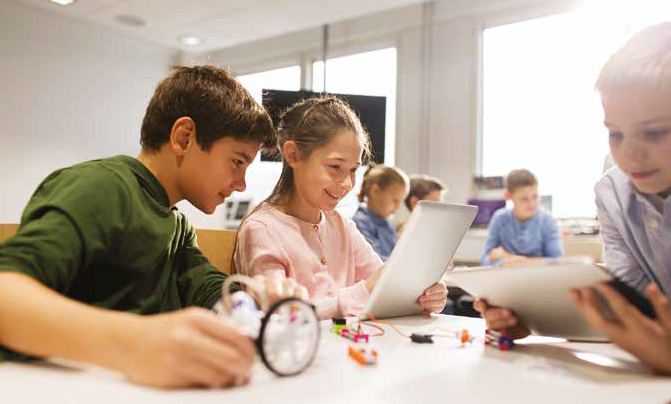The subjects in the fields of mathematics, computer science, natural sciences and technology (STEM) train skills that will be highly sought after in the future labor market. In which ways these key skills learners can independently develop and the learning status can be measured by digital assessment is the topic of a research project conducted by the Department of Continuing Education Research and Educational Technologies at Danube University Krems.
In the course of the EU-funded international research project "Assessment of Transversal Skills in STEM" (ATS STEM), Andrea Ghoneim from the Department of Continuing Education Research and Educational Technologies at Danube University Krems is investigating the question of competences acquisition of the learners. The notorious frontal instruction is to give way to a pupil-centered instruction, in which teachers offer individual support as coaches. In this manner, learning design and the assessment that accompanies the lessons merge. The pupils are instructed to obtain the necessary information independently.
Competences instead of mere knowledge
For years the Common European Framework of Reference for Languages has defined the competences learners need to contribute in language teaching, nothing comparable exists in the STEM subjects - mathematics, computer science, natural sciences and technology. The development of a competence grid that covers the cross-sectional abilities of the STEM subjects is a first objective of the ATS STEM project. It is expected skills such as autonomous learning, searching for and evaluating and presenting information, and critical thinking are included.
The project is embedded in a before and after test, in which the learning success of the 10-13 year olds at lower secondary level will be documented. No pilot classes are planned in Austria. "However, Danube University Krems will participate in both the design and the evaluation of the experiment. It will also provide quality assurance to ensure that all processes of the complex project run smoothly. During the pilot project, learning should be an enriching and sustainable experience for pupils and teachers and the result should provide an important basis for learning in science and technology," says educational researcher Ghoneim, explaining the contribution of the Department of Continuing Education Research and Educational Technologies.
Forms of contemporary assessments
The ATS STEM project lays one focus on using new digital assessments, ranging from ePortfolios to complex test tools that enable PISA-like evaluations. An ePortfolio is the electronic version of a traditional portfolio created in a digital environment that contains text, images, audio and video. In an ePortfolio, students collect learning contents and their ideas, access their collected work, reflect on what they have learned and share all among their peers, set goals, gather feedback and present their achievements. While the ePortfolio is learner-centered and mainly used for formative assessment, tools like PISA center on tests and are suitable for summative assessment. The latter is a concluding assessment, usually expressed in figures. Formative assessment is a verbal assessment that promotes performance.
Title: Assessment of Transversal Skills in STEM
Project Lead: Andrea Ghoneim
Department: Department for Continuing Education Research and Educational Technologies
Duration: 28 February 2019 – 28 February 2022
Contracting: European Union
Funding: Erasmus+
Project Coordination: Dublin City University, Irland
Project Partner:
Danube University Krems, Austria
Het Gemeenschapsonderwijs (GO!), Belgium
Cyprus Pedagogical Institute, Zyprus
H2 Learning, Irland
Kildare Education Centre, Irland
University of Tampere, Finnland
Ministry of Education, Science and Sport, Slovenia
National Education Institute, Slovenia
Universidad de Santiago de Compostela, Spain
Xunta de Galicia, Spain
Haninge Kommun, Sweden
Contact
Mag. Dr. Andrea Ghoneim
Tags


